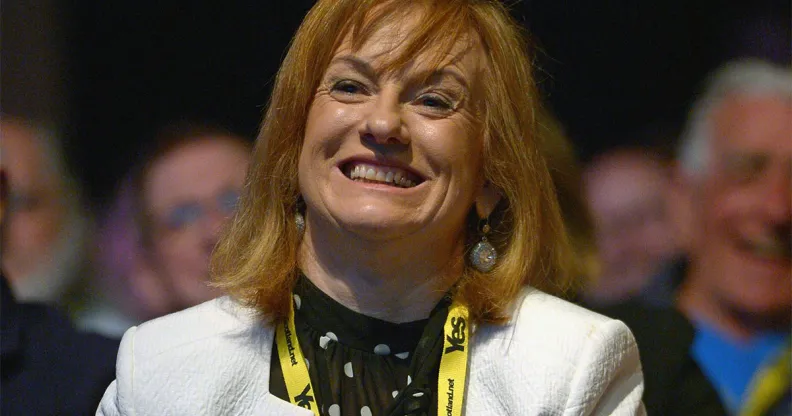Politicians to hear ‘concerns’ about treatment for ‘gender confusion’ in kids. But there’s a major problem

Joan McAlpine MSP attends the Scottish National Party spring conference on April 12, 2014. (Getty)
Politicians in Scotland have been invited to a seminar hosted by the SNP’s Joan McAlpine to hear “concerns” about the impact on children of medical treatments for “gender confusion”.
Scottish National Party politician Joan McAlpine is to host a seminar in Holyrood that has already been accused of “disingenuously” conflating medical treatment for young trans people with potential reforms to Scotland’s gender-recognition laws.
McAlpine, who last year invited an academic who brands trans women “parasites” to speak in the Scottish Parliament on Transgender Day of Remembrance, has invited all MSPs to attend the March 5 seminar.
The seminar is titled “Gender dysphoria/confusion in children and young people” and is “one of several being held to encourage informed discussion and debate about the government’s proposals for reform of the law on gender recognition”, according to the invite seen by PinkNews.
“The seminar is particularly focussed on concerns about the impact on children of medical treatments for gender dysphoria or confusion,” the invite says.
Sisters Scotland, a group of Scottish feminists, said that despite the event being “framed as a reasonable discussion”, it is unlikely to be that, given McAlpine is “entrenched in her views against Gender Recognition Act reform”.
When the Scottish Government announced its plans for GRA reforms – including removing the need for trans people to have a diagnosis of gender dysphoria before being able to update the gender on their birth certificate – last July, following a public consultation, McAlpine said: “I continue to oppose the proposal that will allow any man to identify as female, without the current medical diagnosis, and change the sex on their birth certificate.
“Most people identifying as ‘trans women’ still have male genitals,” she added, going on to say that she believes “biological sex is immutable”.
“The conflation of gender dysphoria with ‘confusion’ and an implied link to the ‘dangers’ of reform for children and young people (when there indeed are none) is disingenuous and ill intended,” Sisters Scotland said.
A spokesperson for the group added: “GRA reform aims to improve the lives of trans people, making it easier to change birth certificates, death certificates and pension details by obtaining a GRC [Gender Recognition Certificate].
“It will not have any effect on the medical treatment available to young trans people. This has been clarified repeatedly by professionals in this field.”
The most common way young trans people with gender dysphoria are helped is by supporting them socially transitioning, which usually involves them changing their name, pronouns, haircut or way of dressing.
Some young trans people with gender dysphoria are prescribed puberty blockers as they approach puberty – a medical treatment that pauses puberty and has been used for decades.
A first-of-its kind study into the links between access to puberty blockers for trans teens who want them and suicide risk found that puberty blockers are “life-saving” and significantly reduce the likelihood of suicide and mental-health problems.
Responding to the news of McAlpine’s event, Colin Macfarlane, director of Stonewall Scotland, said: “There’s widespread misunderstanding about what reform of the Gender Recognition Act means. Reforming the Gender Recognition Act is just about making it easier for trans people to have their gender identity legally recognised on their birth certificate.
“Currently, trans people don’t need to undergo medical transition to access a Gender Recognition Certificate and legal recognition has no impact on a person’s ability to access transition-related care.
“Trans people have waited far too long for equality, so it’s more important than ever that all LGBT+ people and allies come together and respond to the Scottish government’s consultation on the draft bill.”
The three speakers at McAlpine’s event – which is being held 12 days before a public consultation on Scotland’s draft gender-recognition bill closes – are Dr David Bell, Dr Margaret McCartney and Sinead Watson.
Asked by PinkNews whether any transgender people were asked to speak at the seminar, Joan McAlpine said: “One of the speakers [Sinead Watson] underwent transition including hormone treatment and surgery. Transgender people have also been invited to attend and speak from the floor.”
Watson’s bio for the seminar says she “regrets the hormone treatment and surgery that she was encouraged to believe would provide a cure for her distress” and that she “believes that the proposal to allow children of 16 to make life-changing decision about their bodies is dangerous” – despite being in her 20s when undergoing medical treatment and despite GRA reform not impacting trans healthcare.
Joan McAlpine also came under fire last year for inviting Canadian anti-trans journalist Meghan Murphy – who is banned from Twitter for hate speech against trans people – to speak at the Scottish parliament.
McAlpine said of her March 5 event: “Some clinicians are concerned at the rise in diagnosis of gender dysphoria in confused children and young people whose difficulties may be the result of other problems – including, sometimes, homophobia in the family and wider society.
“It is important that MSPs are allowed to hear clinicians who have these concerns.”
Sisters Scotland said that implying GRA reform will “encourage ‘confused’ young people to transition” is “the same narrative used throughout history that suggested LGB rights would ‘make young people gay'”.

